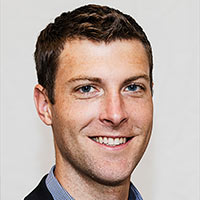Since 1987, the NCI Cancer Prevention Fellowship Program (CPFP) has delivered world-class training in cancer-related research. The four-year postdoctoral program provides leadership activities, professional development, and mentored research across the cancer continuum.
Two years ago, I attained the dream of becoming a cancer prevention fellow. I entered the Shady Grove campus as a biomedical engineer, and my enthusiasm for public health brought me to the Implementation Science (IS) team. My fellowship quickly coalesced around three paths of inquiry: catchment areas, cancer advocacy, and telemedicine.
First, I concentrated on learning about a new component of the Cancer Center Support Grant. In 2016, the Office of Cancer Centers formalized the criteria for Community Outreach and Engagement (COE). The funding announcement stated that Cancer Centers should deploy evidence-based interventions to reduce the burden of cancer within the catchment area. With support from my mentors, I got involved in administrative activities pertaining to community engagement in the NCI-Designated Cancer Center catchment areas, and I listened to a number of presentations concerning the extraordinary research-enabling partnerships at the centers.
While learning about extramural COE programs, I was determined to participate in hands-on community engagement activities. Recently, the Center for Cancer Training created a committee to enhance dialogue between cancer advocates and NCI fellows. When I was a graduate student, a similar community partnership greatly enriched my training experience. I joined the team to strengthen and extend these connections.
Finally, in my fellowship proposal, I pledged "to adapt my approach based on evolving circumstances." With the COVID-19 pandemic, I shifted attention toward telemedicine. I joined a team to quickly review empirical evidence in oncology telehealth, and to identify opportunities in implementation science and clinical practice. This exercise was an immersion into areas of clinical research that were previously unfamiliar to me.
During this time, I received invaluable training experiences. The CPFP fellowship included workshops for leadership and communication skills. I assisted with programmatic activities in the division, and I attended the Implementation Science Consortiums and Cancer Center Community Impact Forums. This environment strengthened my scientific formation and helped prepare for the next stage of my career.
The IS journey is an exciting departure from my original trajectory. In graduate school, I used microfluidic devices to study cancer metabolism. At the time, I failed to imagine the whirlwind transition from bench science into cancer control research. This year, my mentors supported a rapid conversion to projects that are meaningful and important for reducing the population burden of cancer.
As a member of the IS team, I am continuously exposed to new forms of scholarship. I am growing more fluent in methods to accelerate knowledge translation to benefit communities and populations. Looking forward, this training will help me develop the skills to make a positive impact in cancer prevention and control.
Katharine Graham said, "To love what you do and feel that it matters -- how could anything be more fun?" I am having tremendous fun with the fellowship in general, and the IS team in particular. I cherish my mentors, teammates, and research projects. For me, being a CPFP fellow is the best job in the world.
For more information about the Cancer Prevention Fellowship Program, visit www.cpfp.cancer.gov.
The application for 2022 fellows is open from May 1 - August 16, 2021.

Pete DelNero is a former Cancer Prevention Fellow with the Implementation Science team in the Office of the Director in the Division of Cancer Control and Population Sciences at the National Cancer Institute.

Dispatches from the Implementation Science Team, is an episodic collection of short form updates, authored by members and friends of the IS team representing a sample of the work being done and topics that our staff are considering for future projects. Topics address some of the advances in implementation science, ongoing issues that affect the conduct of research studies, reflections on fellowships and meetings, as well as new directions for activity from our research and practice communities.

